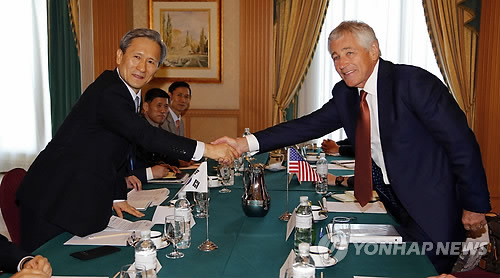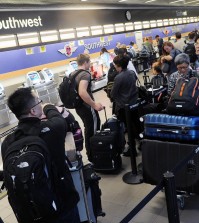- California Assembly OKs highest minimum wage in nation
- S. Korea unveils first graphic cigarette warnings
- US joins with South Korea, Japan in bid to deter North Korea
- LPGA golfer Chun In-gee finally back in action
- S. Korea won’t be top seed in final World Cup qualification round
- US men’s soccer misses 2nd straight Olympics
- US back on track in qualifying with 4-0 win over Guatemala
- High-intensity workout injuries spawn cottage industry
- CDC expands range of Zika mosquitoes into parts of Northeast
- Who knew? ‘The Walking Dead’ is helping families connect
Decision on OPCON transfer unlikely this year

U.S. Defense Secretary Chuck Hagel, right, shakes hands with South Korea’s Defense Minister Kim Kwan-jin during their bilateral meeting in Bandar Seri Begawan, Brunei, Wednesday, Aug. 28, 2013. (AP Photo/Vincent Thian/Yonhap)
By Kang Seung-woo
South Korea and the United States are unlikely to set a specific date this year for the transfer of wartime operational control (OPCON), said a government official, Tuesday.
The OPCON handover from Washington to Seoul is scheduled for December 2015, but the Park Geun-hye administration asked the U.S. in May to reconsider this, citing growing North Korean threats.
“It will be difficult to finalize by the end of the year how long the two countries will postpone the transition,” said the official. “However, they may be able to settle on the conditions of the transfer by October.”
His remarks are different from what were widely expected.
At the Security Consultative Meeting (SCM) in Seoul in October, Defense Minister Kim Kwan-jin and his U.S. counterpart Chuck Hagel agreed to regularly assess and review the security environment on the Korean Peninsula to determine whether Korea is ready to regain OPCON.
In the meeting, the two sides formed a joint task force to study Seoul’s ability to respond to possible provocations from Pyongyang before deciding whether to delay the transition by the first half of the year.
As a result, this year’s SCM, to be held in Washington in October, is seen as a stage before deciding the second delay. In 2007, South Korea and the U.S. agreed that the transition would be carried out on April 17, 2012, before further delaying it after the Navy ship Cheonan was sunk by a North Korean torpedo in March 2010.
The two nations, on the same page regarding putting off the OPCON transfer, are now in the process of evaluating conditions of the handover and in line with them, they had a third working-group meeting in Washington earlier this month.
South Korea handed over both wartime and peacetime operational control of its armed forces to the U.S. in July 1950, a month after the North started the three-year-long Korean War. Seoul regained peacetime operational control in late 1994.
















